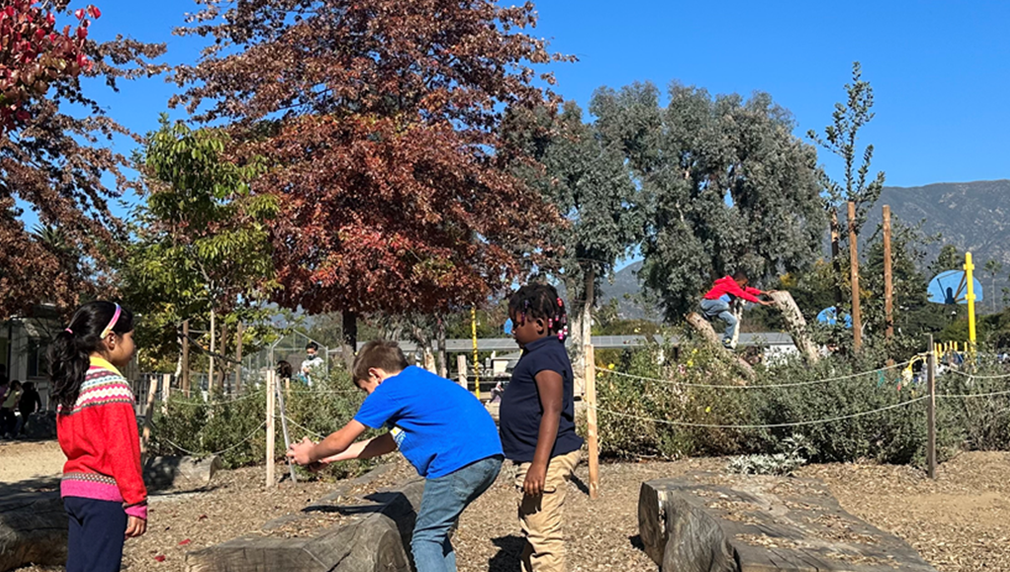Emerald Necklace Watershed Discovery Campuses
Amigos de los Rios seeks to bring Emerald Necklace multi-benefit urban greening to Title 1 schools across L.A. to connect students to the greater Los Angeles Watersheds. Our goal is to transform public schools from their penitentiary-like design to nurturing park-like settings to provide mental health, academic performance, and physical fitness benefits to students. We remove asphalt and bring natural infrastructure elements to schools to introduce biodiversity, address heat islands, capture stormwater, and turn classrooms inside out.

What is the primary issue area that your application will impact?
Green space, park access, and trees
In what stage of innovation is this project, program, or initiative?
Expand existing project, program, or initiative (expanding and continuing ongoing, successful work)
What is your understanding of the issue that you are seeking to address?
L.A. County is one of the nation’s least green urban areas, with environmental justice issues in available urban tree canopy, park, trail and green campus facing socioeconomically challenged areas. In its early years, L.A. commissioned its 1930 Olmsted-Bartholomew Plan, a sustainable urban development vision that called for protecting watersheds, creating a robust urban river greenway network, and treating public schools as parks to protect public health and keep nature in the metro area. L.A. failed to realize this sustainable vision, with far-reaching impacts. Its schools are stark, penitentiary-like environments. L.A. County suffers the state’s worst urban heat islands, with dangerous heat levels trapped in schools’ expansive, barren blacktop and treeless playgrounds. In these settings, students’ academic performance, physical fitness, and mental health are at risk. We must bring nature and natural infrastructure to schools. Emerald Necklace Watershed Stewards are ready to help!
Describe the project, program, or initiative this grant will support to address the issue.
The Emerald Necklace School Greening initiative focuses on engaging community members as volunteers to proactively bring tree canopy and natural infrastructure elements to public school campuses and transform hot barren schools into more nurturing park-like settings. We believe students should experience their campus as a microcosm of the greater watershed they live in and enjoy nature at school. In order to implement this greening work, we have engaged concerned parents, teachers, local businesses, regional college, university and high school students in regular volunteer opportunities where we complete hands-on school greening at Emerald Necklace Watershed Stewardship Events. At each weekend event, we complete site preparation, plant trees, native shrubs, and invest in greening schoolyards for immediate benefits to students. Every school deserves to be greened. Our volunteer database includes students from over 140 regional community colleges, universities,high schools and middle schools, as well as families, service groups, and local business supporters. We provide required tools and hands-on training in urban forestry, natural infrastructure element development as we work together to bring nature to our urban environment. Volunteers help with site preparation, create rain gardens, learn to plant and care of native and Mediterranean trees and shrubs, gaining satisfaction knowing they create nurturing shaded, biodiverse spaces for the school community.
Describe how Los Angeles County will be different if your work is successful.
Our goal is to create an urban forestry network “from the Mountains to the Sea,” treating schools, parks, and river greenways as green hubs that radiate urban forestry out into the community. This collaborative and unifying vision will proactively create landscape-scale conservation. We are working to revive the Olmsted-Bartholomew Plan to protect L.A.’s air, water, biodiversity, and public health, reduce heat islands that most harm vulnerable populations (especially youth), provide equitable natural access, promote active transportation, and celebrate our shared natural and cultural heritage. Central to this vision is a renewed effort to collaborate with public schools, breaking up the typical “prison-yard” construction of school campuses to plant campus trees and shrubs. In addition to the myriad heat, air, water, and health benefits of campus greening, this provides urban youth with enhanced recreation and play spaces, as well as outdoor classrooms and STEAM learning opportunities.
What evidence do you have that this project, program, or initiative is or will be successful, and how will you define and measure success?
This is an existing program that is urgent to expand. We have developed metrics to evaluate its success: we track the number of Emerald Necklace volunteer events held, including Urban Greening, Forest Care, and Community Science. We track the number of volunteer participants and hours served, sites impacted, trees and shrubs planted, measured, and indexed. We measure tree canopy created and calculate how project trees improve air quality, greenhouse gas sequestration, and stormwater capture. We measure surface temperatures before and after planting to capture urban heat island benefits, and track the many types of project amenities created, enhanced, or maintained, including ADA accessible paths, natural infrastructure stormwater capture and water conservation elements created, multicultural interpretive and recreational amenities, and COVID-safe outdoor classrooms, as well biodiversity on campus nature-based play areas created and the number of students at each newly greened school.
Approximately how many people will be impacted by this project, program, or initiative?
Direct Impact: 1,000.0
Indirect Impact: 6,500.0